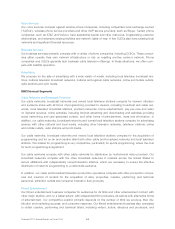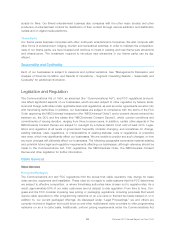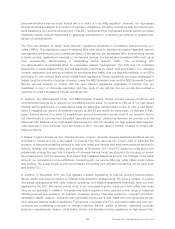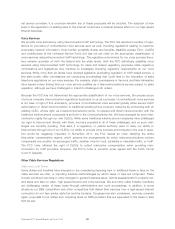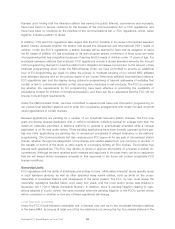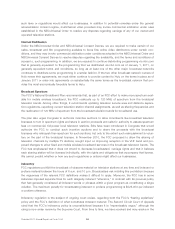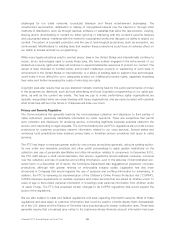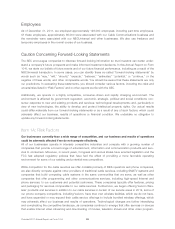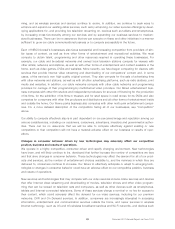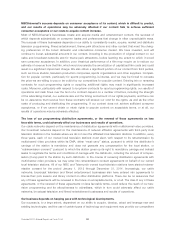Comcast 2011 Annual Report Download - page 26
Download and view the complete annual report
Please find page 26 of the 2011 Comcast annual report below. You can navigate through the pages in the report by either clicking on the pages listed below, or by using the keyword search tool below to find specific information within the annual report.such laws or regulations would affect our businesses. In addition to potential remedies under the general
retransmission consent regime, multichannel video providers may invoke commercial arbitration under rules
established in the NBCUniversal Order to resolve any disputes regarding carriage of any of our owned and
operated television stations.
Internet Distribution
Under the NBCUniversal Order and NBCUniversal Consent Decree, we are required to make certain of our
cable, broadcast and film programming available to bona fide online video distributors under certain con-
ditions, and they may invoke commercial arbitration under conditions adopted in the NBCUniversal Order and
NBCUniversal Consent Decree to resolve disputes regarding the availability, and the terms and conditions of
access to, such programming. In addition, we are required to continue distributing programming via nbc.com
that is generally equivalent to the programming that we distributed via nbc.com as of January 1, 2011, on
generally equivalent terms and conditions, so long as at least one of the other major broadcast networks
continues to distribute some programming in a similar fashion. If the two other broadcast network owners of
Hulu renew their agreements, we must either continue to provide content to Hulu on the terms in place as of
January 2011 or enter into agreements on substantially the same terms as the broadcast network that pro-
vides the most economically favorable terms to Hulu.
Broadcast Spectrum
The FCC’s National Broadband Plan recommends that, as part of an FCC effort to make more spectrum avail-
able for mobile wireless broadband, the FCC reallocate up to 120 MHz of spectrum from the broadcast
television bands. Among other things, it recommends updating television service area and distance separa-
tion regulations, repacking current television station channel assignments, as well as sharing frequencies and
the reallocation of 120 MHz of spectrum from the broadcast television bands for broadband use.
The plan also urges Congress to authorize incentive auctions to allow incumbents like broadcast television
licensees to turn in spectrum rights and share in auction proceeds and calls for authority to assess spectrum
fees on commercial, full-power local television stations. Bills have been introduced in Congress that would
authorize the FCC to conduct such incentive auctions and to share the proceeds with the broadcast
licensees who relinquish their spectrum for such auctions, but only to the extent such relinquishment is volun-
tary on the part of the broadcast licensee. In November 2010, the FCC proposed to allow the sharing of
television channels by multiple TV stations, sought input on improving reception in the VHF band and pro-
posed changes to allow fixed and mobile wireless broadband services in the broadcast television bands. The
FCC has emphasized that it does not intend to decrease broadcasters’ carriage rights and that it believes
each sharing station will be licensed individually, with the rights and obligations that accompany that license.
We cannot predict whether or how any such regulations or actions might affect our businesses.
Indecency
FCC regulations prohibit the broadcast of obscene material on television stations at any time and indecent or
profane material between the hours of 6 a.m. and 10 p.m. Broadcasters risk violating this prohibition because
the vagueness of the relevant FCC definitions makes it difficult to apply. Moreover, the FCC has in some
instances imposed separate fines for each allegedly indecent “utterance,” in contrast with its previous policy
that had generally considered all indecent words or phrases within a given program as constituting a single
violation. The maximum penalty for broadcasting indecent or profane programming is $325,000 per indecent
or profane utterance.
Indecency regulation is the subject of ongoing court review, regarding both the FCC’s “fleeting expletives”
policy and the FCC’s definition of what constitutes indecent material. The Second Circuit Court of Appeals
ruled that the FCC’s indecency policy is unconstitutional because it is “impermissibly vague,” although the
ruling is now under review by the Supreme Court. From time to time, we have received and may receive in the
Comcast 2011 Annual Report on Form 10-K 24


